news
2023 : CBN Governor, Emefiele’s acquired party nomination forms and newly bought fleet of vehicles for his campaign, provokes questions from Nigerians
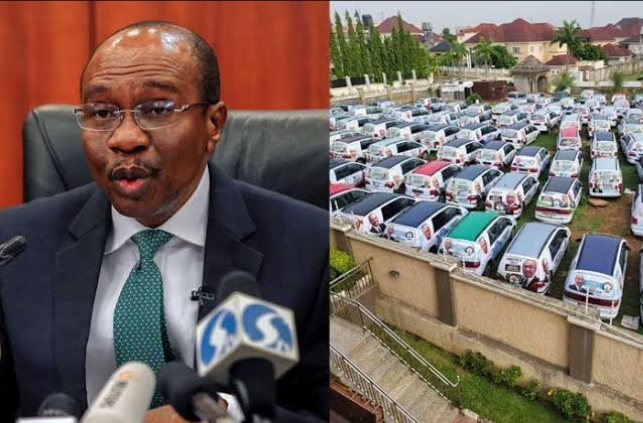
 Governor of the Central Bank of Nigeria, Godwin Emefiele, sent millions of tongues wagging with his decision to purchase the N100 million presidential nomination form of the All Progressives’ Congress (APC) in the build-up to the party’s primary election in June last year. It later emerged that the CBN governor had not only acquired the party’s nomination forms but had also bought a fleet of vehicles for his campaign.
Governor of the Central Bank of Nigeria, Godwin Emefiele, sent millions of tongues wagging with his decision to purchase the N100 million presidential nomination form of the All Progressives’ Congress (APC) in the build-up to the party’s primary election in June last year. It later emerged that the CBN governor had not only acquired the party’s nomination forms but had also bought a fleet of vehicles for his campaign.

As things turned out, however, Emefiele had to give up on the idea of contesting the presidential election due mainly to the public outrage against the idea. The fact remains, however, that the dust raised by that move is yet to settle with the deluge of questions that are left unanswered.
Where are the vehicles now? Who supplied them? How true is the claim that some of the vehicles are now with the campaign organization of a presidential candidate through a governor that is very close to the CBN governor? What does that suggest? A chummy relationship between the said presidential candidate and Emefiele? How neutral is the CBN governor
Since his foray into politics exemplified by his failed presidential bid, how much time does he have for monetary matters which constitute the core mandate of the CBN? How has he fared on this assignment? What was the rate of inflation before he assumed office and what is it now? What was the exchange rate before he assumed office and now? What was the country’s foreign reserve then and now? What has become of his rice pyramids?
Earlier in the week, he compounded failure with insensitivity, describing the millions of Nigerians on queues at ATM points around the country as miscreants who had no need for cash but were only there to sell their turns for some others in dire need of cash. Really?
There is an adage to the effect that when a leaf stays too long on a bar of soap, the leaf itself would turn into soap. That seemed to be the case with the relationship between President Muhammadu Buhari and the Central Bank Governor Godwin Emefiele. The latter appears to have rubbed mind so much with the former that he has caught the spirit of a soldier
Since the scarcity of notes and consequent agitation provoked by the naira redesigning policy, Emefiele, a finance man, has elected to speak like a soldier and issue threats on a daily basis rather than speak with facts and figures. Because he takes orders from a soldier, he now thinks and acts as one; no longer as a sober, shrewd, reflective and analytical financial expert.
Consequent on the foregoing, everything about naira redesigning, a poorly implemented policy that has shaken the nation to its foundation in recent weeks, has been opaque. In his broadcast to the nation on Thursday, Buhari had admitted that he approved the policy. But from every indication, it was a unilateral decision on the part of the President, and that much came to light when the Minister of Finance declared on national television that she had no knowledge of it.
Was the policy debated by the Federal Executive Council? No. So who did the President discuss the idea with apart from Emefiele? We may never know. Like President Buhari, Emefiele is keeping everything to himself. He would not disclose how much of the new notes have been printed or the breakdown of the total N2.1 trillion that has been returned to the banks. Buhari directed that the N200 notes already collected from the public should be re-circulated. But what is the value? Emefiele does not think we should know.
Kaduna State Governor Nasir el-Rufai, says the amount in question will not solve the problem of naira scarcity, noting that over N2 trillion was withdrawn while only N400 billion had been printed as at February. But rather than debunk the governor’s claims with facts and figures, Emefiele is asking security agents to go after POS operators. He forgot his elementary economics that this is what you get in times of scarcity.
news
Update : Seyi Tinubu Responds to King Mitchy, VeryDarkMan Saga
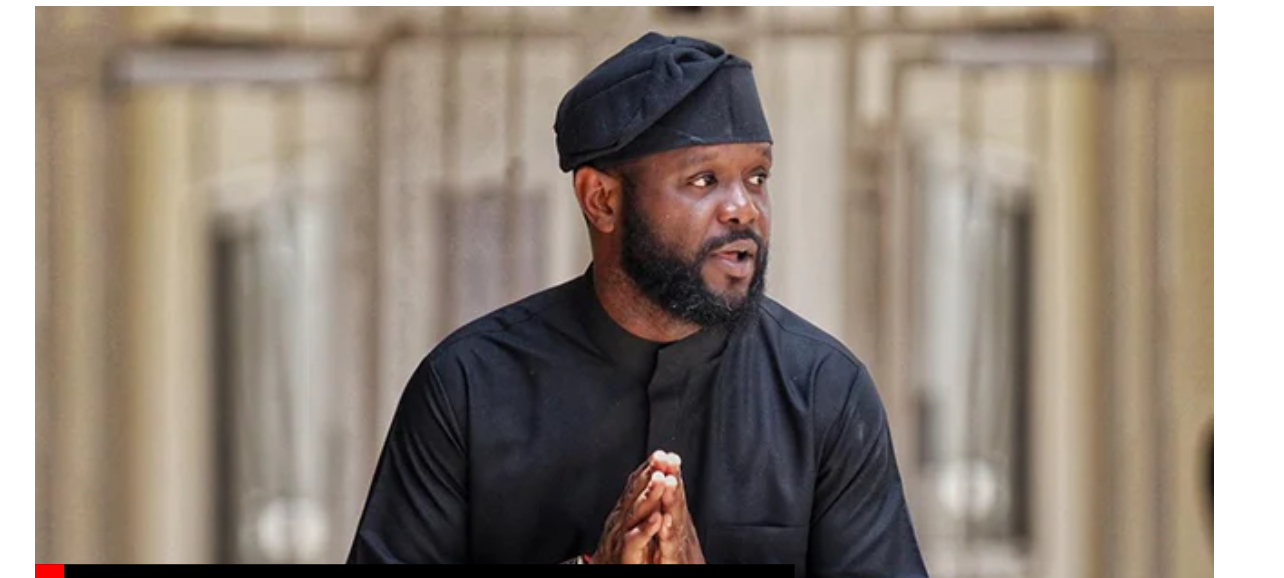
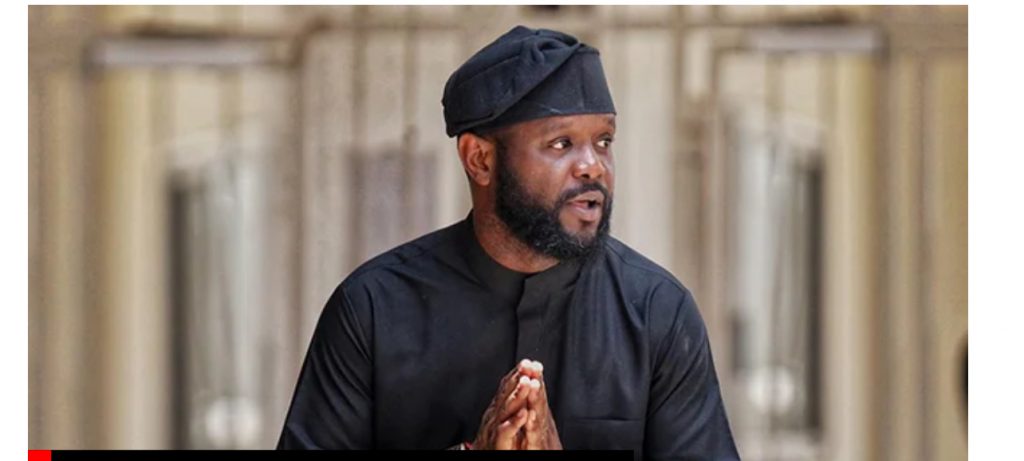
Seyi Tinubu, son of President Bola Tinubu, has issued a statement debunking allegations linking him to a feud between social media personalities Martins Vincent Otse, popularly called VeryDarkMan, and Mitchell Mukoro, widely known as King Mitchy.
The controversy stems from claims suggesting an improper relationship or secret arrangements between Seyi Tinubu and King Mitchy, which VeryDarkMan has reportedly used to intensify his online narrative.
Our correspondence reports that philanthropist and content creator King Mitchy recently announced that she renovated a dilapidated school in six days, suggesting that the project was proof that meaningful change could happen swiftly when there was genuine intent.
However, she reportedly made comments widely interpreted as subtle jabs at VeryDarkMan, who, in turn, accused her of being used as a political pawn to launder the image of President Bola Tinubu’s administration.
Tagging the President’s son. VeryDarkMan was said to have alleged in another video that both Seyi Tinubu and King Mitchy were threatening his life.
Addressing the comments in a statement shared on Instagram on Saturday, Seyi Tinubu categorised the allegations and insinuations as false.
He clarified the nature of his interaction with King Mitchy, framing it strictly within the bounds of his long-standing philanthropic work.
Tinubu wrote, “I met Mitchy once, in a public setting, alongside others. On that occasion, I provided financial support toward her NGO activities, just as I have supported many young Nigerians and organisations working to empower our people.
“A follow-up meeting had been scheduled for me to receive an update on the impact of her NGO’s work following the donation. That meeting did not take place because I have been unwell.”
He categorically denied any private encounters, saying, “There has never been a private encounter, no secret arrangement, and no impropriety of any kind.”
Tinubu took direct aim at VeryDarkMan, accusing the activist of using a feud he had no part in to attack his reputation.
He wrote, “What is deeply concerning is that a feud I did not start, and in which I have played no part, has been used as a vehicle to insert my name into a narrative without basis in truth.
“For reasons best known to him, VDM appears to have been looking for a trigger, an opportunity to attack and attempt to harm my reputation and seized upon this situation to do so. I will not accept that.
“If my name generates attention, let us at least deal in facts. Supporting charitable causes is not a crime. Meeting someone publicly to support their NGO is not a scandal. Repeating falsehoods loudly does not transform them into truth.”
Tinubu asserted that he won’t be intimidated by “fictional” narratives, emphasising that he refuses to be bullied.
“I will not be bullied, and I will not dignify fiction with panic.
“I have experienced bullying before, and I understand the harm it can cause. That is why I take a firm stance against it,” he said.
Tinubu concluded by reaffirming his commitment to serving Nigerian youth through his foundation, insisting that “philanthropy and outreach must never be politicised or weaponised.”
“To those seeking to manufacture controversy: Nigeria needs builders, not bullies. We need responsible discourse, not sensationalism driven by speculation.
“I firmly reject the accusations made against me. I call for de-escalation, for restraint, and for a return to truth and responsibility,” he added.
news
Security Reform: Tinubu Calls for Urgent Constitutional Backing for State Police
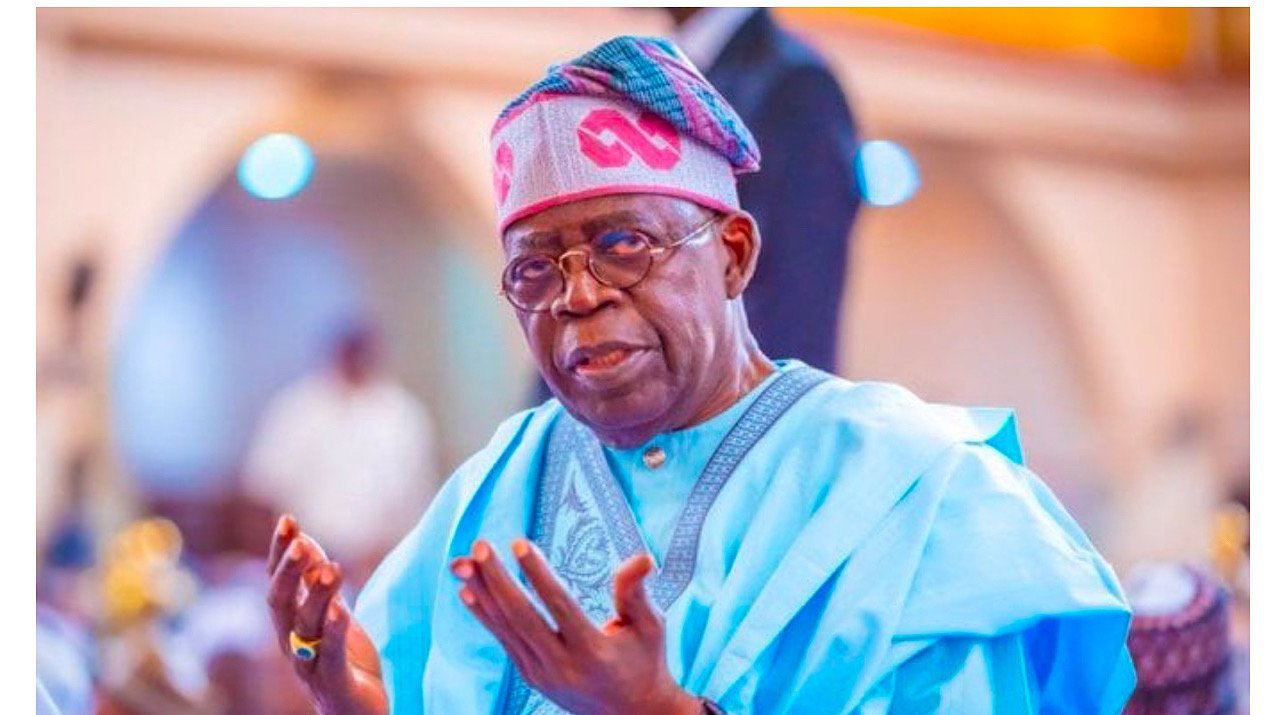

…raises fresh alarm over terrorism, banditry at State House Iftar
…Akpabio pledges more support, vows no executive bill will die in Senate
President Bola Ahmed Tinubu on Wednesday night formally urged the Senate to begin the process of amending the 1999 Constitution to provide for the establishment of state police, declaring that Nigeria must urgently restructure its security architecture to confront terrorism, banditry and insurgency.
Speaking at an interfaith breaking of fast with the leadership and members of the Senate at the State House, Abuja, the President said the time had come for lawmakers to “start thinking” about embedding state policing in the Constitution to enable governments at subnational levels better secure their territories.
“Nigeria is extremely challenged, we are facing terrorism, banditry, insurgency, but you never failed to make a right response to these calls. What I will ask for tonight is for you to start thinking how best to amend the Constitution to incorporate the state police for us to secure our country, take over our forests from marauders, free our children from fear”, Tinubu said.
The President’s latest appeal adds momentum to a campaign he has sustained since early in his administration.
In February 2024, during an emergency meeting with the 36 state governors at the State House, Tinubu approved the creation of a joint committee of federal and state representatives to explore modalities for establishing state police, insisting that the country must “move aggressively” to improve security of lives and property.
He renewed the call in November 2025, urging the National Assembly to begin reviewing relevant laws to allow states willing to establish their own policing structures to do so.
At the APC National Caucus meeting in December 2025, he again pressed governors and lawmakers to back constitutional reforms for state police and local government autonomy.
Only days ago, at an interfaith breaking of fast with governors at the Presidential Villa, the President declared that state police “can’t wait” and “will not be postponed,” urging preparations for what he described as a necessary shift in the nation’s security architecture.
At Wednesday’s gathering with senators, Tinubu framed the proposed reform as a constitutional obligation anchored on unity and shared responsibility.
“What you have faced in the challenging period of this country, the terrorism and banditry, is causing us havoc and we should pull together, unite in a way that our forefathers contemplated to bring about a constitutional democracy and pull us together. They didn’t say we should fight,” he said.
Beyond security, the President expressed deep appreciation to lawmakers for supporting what he described as bold and necessary economic reforms.
“I have a lot of credit for bold reforms. Without your collaborations, without your inspirations, those reforms are not possible. We are reformists together,” he said.
Tinubu defended the removal of petrol subsidy and foreign exchange reforms, describing them as steps taken to halt “monumental corruption.”
“What we gave up and what we stopped is a monumental corruption in subsidy. We gave it up. We don’t want to participate in monumental corruption, in arbitrage, foreign exchange,” he stated.
‘Amend Constitution to accommodate state police’
State police and questions Nigeria can no longer avoid
Senate backs state police, technology-driven reforms to boost Nigeria’s security
According to him, the reforms have laid the foundation for economic stability.
“You don’t have to chase me for dollars. In the past, you could see what Nigeria is today. You should be proud… What we are enjoying is stable economy, prosperity beckoning on us. We just need to work hard for it,” he added.
Responding to criticisms from political opponents, the President dismissed claims that he was stifling opposition voices.
“When they accused me of killing oppositions, I didn’t have a gun… I can’t blame anybody from jumping out of a sinking ship if they did,” he said, in apparent reference to recent defections.
He described the coincidence of Ramadan and Lent as symbolic of national unity and called for continued harmony between the executive and legislature.
“We are committed to Nigerian entity succeeding. We are committed to make law for the welfare, prosperity of the country. I think we are committed together to govern together,” he said.
In his response, President of the Senate, Senator Godswill Akpabio, assured the President of the chamber’s loyalty and continued cooperation.
“We have nothing to give to you than to assure you of our loyalty,” Akpabio said. “I’m sure you have noticed that nothing you have ever sent to us died in first reading, and it will never happen.”
He said the Senate painstakingly reviews executive proposals to ensure they serve national interest, even when they initially attract criticism.
“We sit down to painstakingly go through everything that comes before us, and then at the end, we see that it is in the interest of Nigerians, even when the social media is not seeing it,” he said.
Akpabio commended Tinubu’s tax reforms, foreign exchange unification, fuel subsidy removal and the recent electoral amendment, noting that the President promptly assented to the revised Electoral Act when convinced it served national interest.
He expressed optimism that by 2031, Nigeria would be more prosperous under Tinubu’s leadership and offered prayers for peace amid what he described as “troubles and sponsored insecurity” in parts of the country.
The Senate President also thanked Tinubu for appointing former Senator Jimoh Ibrahim as an ambassador, describing it as recognition of legislative talent.
The interfaith gathering ended with prayers for unity, wisdom and strength for the nation’s leaders as they navigate security and economic challenges.
news
BREAKING: Tinubu Names Tunji Disu Acting Inspector General After Egbetokun’s Exit

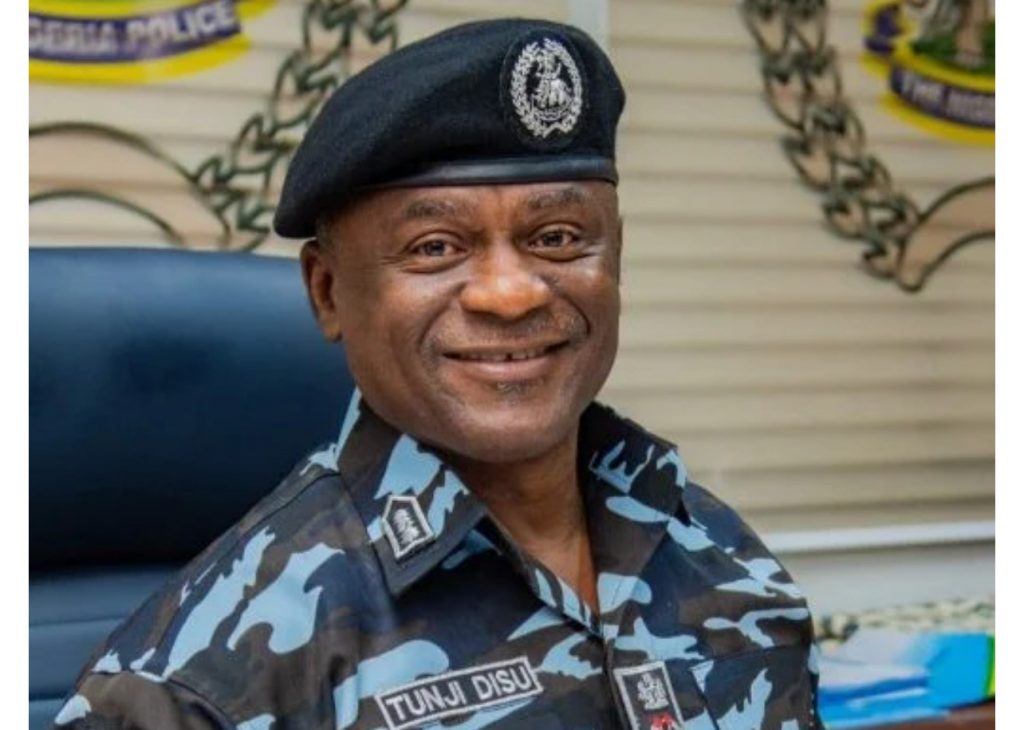
President Bola Tinubu has accepted the resignation of the Inspector-General of Police, Kayode Egbetokun, and approved the appointment of Tunji Disu as Acting Inspector-General of Police with immediate effect.
Our correspondent had earlier reported that Egbetokun tendered his resignation letter on Tuesday, citing pressing family considerations.
Appointed in June 2023, Egbetokun was serving a four-year term scheduled to conclude in June 2027, in line with the amended provisions of the Police Act.
In a statement issued on Tuesday by his Special Adviser on Information and Strategy, Bayo Onanuga, the President received the letter earlier on Tuesday and expressed appreciation for his service to the nation.
He also commended Egbetokun’s “decades of distinguished service to the Nigeria Police Force and the nation,” acknowledging his “dedication, professionalism, and steadfast commitment to strengthening internal security architecture during his tenure.”
“In view of the current security challenges confronting the nation, and acting in accordance with extant laws and legal guidance, President Tinubu has approved the appointment of Assistant Inspector-General of Police Tunji Disu to serve as Acting Inspector-General of Police with immediate effect.
“The President is confident that AIG Disu’s experience, operational depth, and demonstrated leadership capacity will provide steady and focused direction for the Nigeria Police Force during this critical period,” the statement read.
It added that in compliance with the provisions of the Police Act 2020, the President will soon convene a meeting of the Nigeria Police Council to formally consider Disu’s appointment as substantive Inspector-General of Police, after which his name will be forwarded to the Senate for confirmation.
The President reaffirmed his administration’s commitment to enhancing national security, strengthening institutional capacity, and ensuring that the Nigeria Police Force remains professional, accountable, and fully equipped to discharge its constitutional responsibilities.
-

 news5 years ago
news5 years agoUPDATE: #ENDSARS: CCTV footage of Lekki shootings intact – Says Sanwo – Olu
-

 lifestyle6 years ago
lifestyle6 years agoFormer Miss World: Mixed reactions trail Agbani Darego’s looks
-

 health5 years ago
health5 years agoChairman Agege LG, Ganiyu Egunjobi Receives Covid-19 Vaccines
-

 lifestyle4 years ago
lifestyle4 years agoObateru: Celebrating a Quintessential PR Man at 60
-

 health6 years ago
health6 years agoUPDATE : Nigeria Records 790 new cases of COVID-19
-

 health6 years ago
health6 years agoBREAKING: Nigeria confirms 663 new cases of COVID-19
-

 entertainment1 year ago
entertainment1 year agoAshny Set for Valentine Special and new Album ‘ Femme Fatale’
-

 news9 months ago
news9 months agoBREAKING: Tinubu swears in new NNPCL Board


